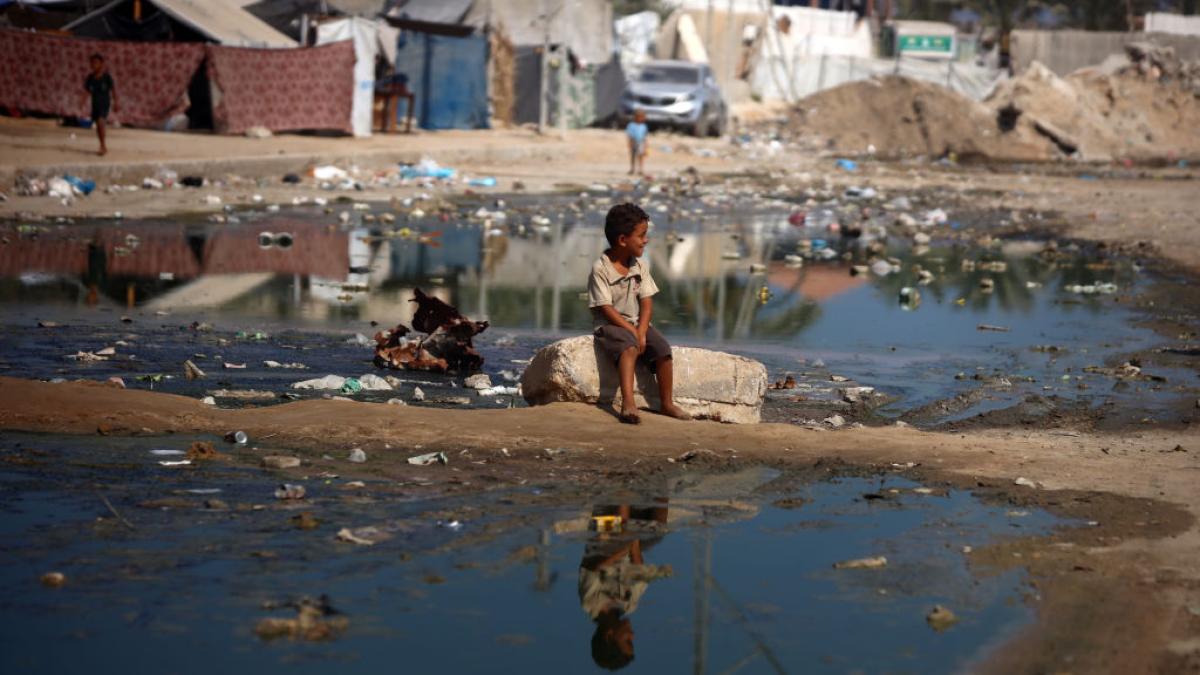Gaza Health Ministry Declares Polio Epidemic

Gaza’s Health Ministry has declared the strip a “polio epidemic zone” ten days after the World Health Organization (WHO) confirmed the discovery of the disease in wastewater in the center and south of the Palestinian enclave. Palestinian health authorities blame the Israeli military operation. “This poses a health risk to the people of the Gaza Strip and neighboring countries and is a setback for the global polio eradication program,” the ministry in the Islamist-run enclave said in a statement.
Polio has been found in wastewater, which also poses a risk of outbreaks of diseases such as cholera. There are currently no cases of polio in the population, but they have been detected in six out of seven environmental samples taken in the Palestinian enclave. It is also a very difficult situation to monitor, as 200,000 people have been displaced this week alone. That is 9% of Gaza’s population.
For this reason, the WHO is “extremely concerned” and already said in mid-July that there was a “high risk” of an outbreak in the Gaza Strip. In late June, the UN already warned that it estimated that 70% of Gaza’s water and sewage systems had been destroyed or damaged by Israeli bombing since the start of the war. According to humanitarian agencies, that figure includes five sewage treatment plants in the Strip.
The Health Ministry accuses the Netanyahu administration of cutting off Gazans’ access to water, destroying sewage infrastructure and overcrowding the population in displacement areas, leading to the emergence of polio in the wastewater of Khan Younis (south) and governorates in the central part of the enclave.
The WHO regrets that “after many years of eradication” of the disease in the Palestinian territories, the enclave is threatened by its possible return. “The program to combat the epidemic launched by the ministry in cooperation with relevant international institutions, especially UNICEF and the World Health Organization, will not be enough,” the statement said.
The amount goes
Health demanded an end to the war in the enclave as a way to find a “radical” solution to problems such as lack of drinking water, hygiene products (such as disinfectants and other cleaning products), sewer repairs, and removal of tons of garbage and solid waste.
The war has led to a drop in childhood vaccination rates from semi-universal to “just over 85%” as a result of the constant displacement that Gazans must endure, according to Philippe Lazzarini, the commissioner-general of the UN agency for Palestine refugees (UNRWA).
Faced with a possible outbreak of the disease, the Israeli army announced on July 21 that it would vaccinate its soldiers against the disease.
A recent report by Oxfam Intermón has shown that Israel is systematically using water as a weapon of war against the Palestinian population in the Gaza Strip, disregarding human life and international law. The study Water war crimes (Water War Crimes) concludes that Israeli tactics are based on cutting off water supplies.
According to the organization, “systematic destruction of water facilities and deliberate blocking of aid have reduced the amount of water flowing into Gaza by 94%, to 4.74 liters per person per day, just under a third of the minimum amount recommended in an emergency.” and less than a flush from a toilet.
Gaza’s Health Ministry said in its latest update that more than 39,300 Palestinians have been killed and more than 90,589 wounded since Israeli forces launched an offensive against Hamas in response to the October 7 attack in Israel.
Negotiations have reached a dead end
The new crisis comes as Israeli Prime Minister Benjamin Netanyahu responds to accusations from Hamas that he is “circumventing” the ceasefire pact with his demands, ensuring that the Islamists demanded “29 changes” to the proposal and did not respond “to the original plan,” according to a statement from his office.
“The Hamas leadership is obstructing the agreement,” the text says, while “Israel has not changed or added any conditions to the scheme,” contrary to what the Islamist group accuses it of.
The prime minister assured that he was maintaining his principles “in line with the original outline” of the proposal: maximizing the number of live hostages returned to Israeli territory, controlling the Philadelphi Corridor (the 14-kilometer strip that forms the border between Egypt and Gaza, which the army has dominated for more than a month) and preventing Islamist militias from accessing the northern part of the Strip.
The clash of accusations arose after statements by a source in the Egyptian security services following a meeting in Rome between mediators and an Israeli delegation led by the head of foreign intelligence (Mossad) David Barnea.
The source said the delegation presented new demands at a meeting with teams from the US, Qatar and Egypt as a security mechanism for “screening displaced persons upon their return to the northern Gaza Strip when the ceasefire begins” or maintaining an Israeli presence on the Palestinian side of the Rafah crossing.
The latter coincides with the demand to remain in the Philadelphia axis, although this measure is not accepted by the mediators, especially Egypt.
“We demand to know what new conditions have been introduced that were not part of the original agreement proposed by the Israeli government,” the Forum of Families of Hostages and Missing Persons movement insisted in a statement released in the evening.
Israeli media outlets such as Walla repeated the same demands of the delegation, which constituted an “updated proposal,” citing senior Israeli officials.
This afternoon, Hamas called the demands, which Netanyahu is defending against, “a delay and avoidance of reaching an agreement.”
The parties continue to negotiate a ceasefire agreement to exchange Israeli hostages (living and dead) and Palestinian prisoners, although the final end to the war and the “day after tomorrow” remains a constant point of contention between Israel and Hamas.
